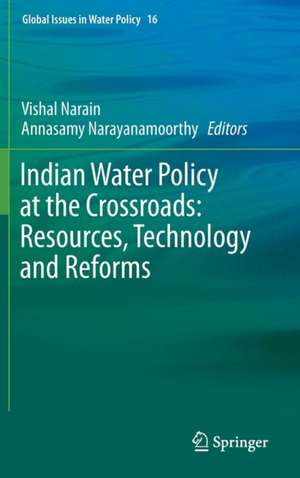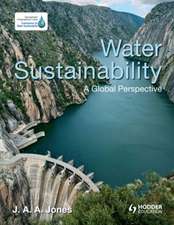Indian Water Policy at the Crossroads: Resources, Technology and Reforms: Global Issues in Water Policy, cartea 16
Editat de Vishal Narain, Annasamy Narayanamoorthyen Limba Engleză Hardback – 19 ian 2016
The contributors review current debate on these and other subjects shaping the governance of water resources, and take stock of new policy developments. The book examines the experience of policy implementation, and shows where important weaknesses still lie. The authors present a roadmap for the future, and discuss the potential of alternative approaches for tackling emerging challenges. A case is made for greater emphasis on a discursive analysis of water policy, to examine underlying policy processes.
The contributors observe that
the ongoing democratization of water governance, coupled with the multiplication of stresses on water, will create a more visible demand for platforms for negotiation, conflict resolution and dialogue across different categories of users and uses. Finally, the authors propose that future research should challenge implicit biases in water resources planning and address imbalances in the allocation of water from the perspectives of both equity and sustainability.
| Toate formatele și edițiile | Preț | Express |
|---|---|---|
| Paperback (1) | 637.59 lei 43-57 zile | |
| Springer International Publishing – 30 mar 2018 | 637.59 lei 43-57 zile | |
| Hardback (1) | 643.84 lei 43-57 zile | |
| Springer International Publishing – 19 ian 2016 | 643.84 lei 43-57 zile |
Din seria Global Issues in Water Policy
- 18%
 Preț: 956.81 lei
Preț: 956.81 lei - 15%
 Preț: 645.96 lei
Preț: 645.96 lei - 18%
 Preț: 966.27 lei
Preț: 966.27 lei - 15%
 Preț: 649.87 lei
Preț: 649.87 lei - 24%
 Preț: 639.68 lei
Preț: 639.68 lei - 20%
 Preț: 574.08 lei
Preț: 574.08 lei - 19%
 Preț: 519.80 lei
Preț: 519.80 lei - 18%
 Preț: 786.36 lei
Preț: 786.36 lei -
 Preț: 432.12 lei
Preț: 432.12 lei - 15%
 Preț: 649.06 lei
Preț: 649.06 lei - 15%
 Preț: 635.15 lei
Preț: 635.15 lei -
 Preț: 395.09 lei
Preț: 395.09 lei - 18%
 Preț: 953.65 lei
Preț: 953.65 lei - 20%
 Preț: 595.16 lei
Preț: 595.16 lei - 15%
 Preț: 664.61 lei
Preț: 664.61 lei - 24%
 Preț: 820.64 lei
Preț: 820.64 lei - 18%
 Preț: 945.14 lei
Preț: 945.14 lei - 24%
 Preț: 800.73 lei
Preț: 800.73 lei - 24%
 Preț: 685.91 lei
Preț: 685.91 lei - 19%
 Preț: 555.11 lei
Preț: 555.11 lei - 23%
 Preț: 806.95 lei
Preț: 806.95 lei - 24%
 Preț: 698.16 lei
Preț: 698.16 lei - 15%
 Preț: 635.96 lei
Preț: 635.96 lei - 18%
 Preț: 959.82 lei
Preț: 959.82 lei - 18%
 Preț: 956.03 lei
Preț: 956.03 lei - 18%
 Preț: 963.91 lei
Preț: 963.91 lei - 15%
 Preț: 642.18 lei
Preț: 642.18 lei - 18%
 Preț: 960.30 lei
Preț: 960.30 lei
Preț: 643.84 lei
Preț vechi: 757.46 lei
-15% Nou
Puncte Express: 966
Preț estimativ în valută:
123.20€ • 128.95$ • 102.54£
123.20€ • 128.95$ • 102.54£
Carte tipărită la comandă
Livrare economică 31 martie-14 aprilie
Preluare comenzi: 021 569.72.76
Specificații
ISBN-13: 9783319251820
ISBN-10: 3319251821
Pagini: 231
Ilustrații: VIII, 231 p. 14 illus., 4 illus. in color.
Dimensiuni: 155 x 235 x 14 mm
Greutate: 0.51 kg
Ediția:1st ed. 2016
Editura: Springer International Publishing
Colecția Springer
Seria Global Issues in Water Policy
Locul publicării:Cham, Switzerland
ISBN-10: 3319251821
Pagini: 231
Ilustrații: VIII, 231 p. 14 illus., 4 illus. in color.
Dimensiuni: 155 x 235 x 14 mm
Greutate: 0.51 kg
Ediția:1st ed. 2016
Editura: Springer International Publishing
Colecția Springer
Seria Global Issues in Water Policy
Locul publicării:Cham, Switzerland
Public țintă
ResearchCuprins
1. Introduction: Towards a Discursive Analysis of Indian Water Policy.- 2. The Precept and Practice of Integrated Water Resources Management (IWRM) in India.- 3. Groundwater Depletion in India: Potential of Alternative Approaches and Policy Instruments.- 4. Drinking Water Supply in India: Context and Prospects.- 5. Gender and Water in India: A Review.- 6. Independent Regulatory Agencies in Water Sector in India: Debate and Discourse.- 7. River Linking Project: A Solution or Problem to India’s Water Woes?.- 8. Water Pollution: Extent, Impact, and Abatement.- 9. Regulatory Instruments and Demand Management of Water: Potential and Prospects.- 10. Water Rights and Entitlements in India.- 11. Water Saving Technology in India: Adoption and Impacts.
Textul de pe ultima copertă
This book reviews and analyzes emerging challenges in water policy, governance and institutions in India. Recent times have seen the contours of water policy shaped by new discourses and narratives; there has been a pluralization of the state and a changing balance of power among the actors who influence the formulation of water policy. Discourses on gender mainstreaming and Integrated Water Resource Management (IWRM) are influential, though they have often remained rhetorical and difficult to put into practice. Debate over property rights reform and inter-linking of rivers has been polarized. At the same time, there has been a rising disenchantment with policy initiatives in participatory irrigation management, cleaning up of water bodies and pollution control. Fast depletion of groundwater resources and the importance of adopting new irrigation methods are getting increased focus in the recent policy dialogue.
The contributors review current debate on these and other subjects shaping the governance of water resources, and take stock of new policy developments. The book examines the experience of policy implementation, and shows where important weaknesses still lie. The authors present a roadmap for the future, and discuss the potential of alternative approaches for tackling emerging challenges. A case is made for greater emphasis on a discursive analysis of water policy, to examine underlying policy processes.
The contributors observe
that the ongoing democratization of water governance, coupled with the multiplication of stresses on water, will create a more visible demand for platforms for negotiation, conflict resolution and dialogue across different categories of users and uses. Finally, the authors propose that future research should challenge implicit biases in water resources planning and address imbalances in the allocation of water from the perspectives of both equity and sustainability.
The contributors review current debate on these and other subjects shaping the governance of water resources, and take stock of new policy developments. The book examines the experience of policy implementation, and shows where important weaknesses still lie. The authors present a roadmap for the future, and discuss the potential of alternative approaches for tackling emerging challenges. A case is made for greater emphasis on a discursive analysis of water policy, to examine underlying policy processes.
The contributors observe
that the ongoing democratization of water governance, coupled with the multiplication of stresses on water, will create a more visible demand for platforms for negotiation, conflict resolution and dialogue across different categories of users and uses. Finally, the authors propose that future research should challenge implicit biases in water resources planning and address imbalances in the allocation of water from the perspectives of both equity and sustainability.
Caracteristici
Provides a comprehensive overview of emerging challenges in water policy and governance in India Offers a critical review of key points of debate, including Integrated Water Resource Management and the discourse on rights and gender The contributors bring expertise in many different disciplines, and represent diverse backgrounds from academic to practitioner










